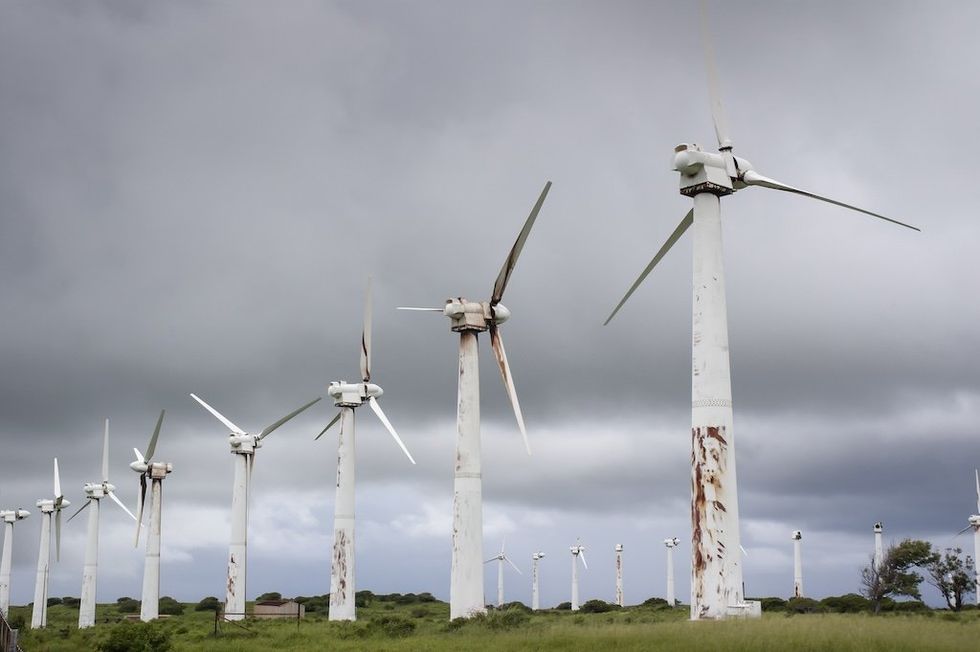If Trump wins, the Green New Deal must go
Health insurance premiums, both individual and employer-sponsored, have more than doubled since the passage of the Affordable Care Act. Today, Americans continue to face the heavy burden of high health care costs, partly because Republicans previously promised to repeal the law but failed to follow through when they regained power.Now, eight years later, Republicans face a similar challenge with the Biden administration’s Green New Deal. If they do not fully repeal it, the rising costs of energy will follow the trajectory of health care expenses.When it comes to dismantling sweeping socialist programs enacted by Democratic presidents, we rarely get second chances.Immediate conservative action is crucial. Lobbyists, donors, and trade associations close to Republican officials seem intent on preserving the key aspects of the law. Goldman Sachs reports that, without statutory caps on tax credits, subsidies for inefficient energy sources under the inaptly named Inflation Reduction Act could reach $1.2 trillion by 2032. Although much of this funding remains unspent, conservatives need to take swift action to rescind the law before it accelerates the shift from reliable energy sources to unworkable alternatives.One might expect the oil and gas industry to strongly oppose these subsidies. Yet, like many sectors in today’s venture socialist environment, they find ways to profit from government interventions. Their approach is, “If you can’t beat ’em, join ’em.” Similar to how they benefited from trading credits tied to the ethanol mandate — ultimately convincing Donald Trump to maintain the mandate — they are now seeking gains from the complex and costly carbon capture program established by the new law.The Wall Street Journal reports that Exxon Mobil, Phillips 66, and Occidental Petroleum are negotiating with the Trump campaign to preserve subsidies that serve their interests. They fear losing tax credits crucial for their investments in renewable fuels, carbon capture, and hydrogen — expensive technologies that require U.S. support during their initial stages.Driven by regulations, subsidies, and a shift toward green energy, Exxon and Chevron have invested over $30 billion in carbon capture, hydrogen, and biofuels. Meanwhile, Phillips 66 aims to leverage “renewable fuels” credits to increase vegetable oil production — an ingredient now widely considered harmful to humans — over refining crude oil.“If we win, we need to take a scalpel, not an ax, to the IRA,” said Sen. Kevin Cramer (R-N.D.), a liberal Republican from an energy-producing state.In August, 18 House Republicans sent a letter to Speaker Mike Johnson (R-La.) urging that the GOP maintain “the energy tax regime,” which includes substantial subsidies for impractical energy sources. This followed announcements from the Chamber of Commerce and the American Petroleum Institute that they would oppose any efforts to fully dismantle the Biden-Harris administration’s green energy policies.For those who remember the fight over Obamacare, this situation feels like déjà vu. Republican special interests aim to preserve the core elements of the controversial law while seeking more flexibility to produce oil and gas by removing drilling taxes and regulations. The issue is that with substantial funding backing these inefficient energy forms, resource misallocation will continue to push the risky “transition” and hurt consumers.Trump must remain as bold as he is clear in advocating for the complete repeal of all subsidies. His stance should be: “No headwinds and no tailwinds to any single industry.” In a low-regulation, non-subsidized environment, industries that can adapt and succeed will thrive, ultimately benefiting consumers. There remains ample opportunity for companies to profit under policies that support the development of oil and gas pipelines, LNG terminals, oil refineries, and a revival of coal production.After decades of subsidizing and mandating “renewable” fuels, it’s time to stop treating this rent-seeking scheme as an emerging industry. Instead, we should demand that it prove its worth on a level playing field. If wind, solar, electric vehicles, and carbon capture can thrive without special treatment, then great — let them.However, if we continue subsidizing failure, it will only result in shifting our national grid to less reliable sources, which won't support us during natural disasters. This issue will be compounded by the government’s push for electric vehicles. Building an electric grid dependent on weak energy sources while increasing demand for EVs is a recipe for disaster. All these subsidies must end.Imagine facing hurricane season, power restoration, and disaster recovery with a grid and vehicles powered by energy sources that wouldn’t survive in a fair market. Compare Florida's swift power restoration after hurricanes to Texas’ struggle during the 2021 winter grid failure. The $66 billion that Texas, a state under Republican control, spent on w


Health insurance premiums, both individual and employer-sponsored, have more than doubled since the passage of the Affordable Care Act. Today, Americans continue to face the heavy burden of high health care costs, partly because Republicans previously promised to repeal the law but failed to follow through when they regained power.
Now, eight years later, Republicans face a similar challenge with the Biden administration’s Green New Deal. If they do not fully repeal it, the rising costs of energy will follow the trajectory of health care expenses.
When it comes to dismantling sweeping socialist programs enacted by Democratic presidents, we rarely get second chances.
Immediate conservative action is crucial. Lobbyists, donors, and trade associations close to Republican officials seem intent on preserving the key aspects of the law. Goldman Sachs reports that, without statutory caps on tax credits, subsidies for inefficient energy sources under the inaptly named Inflation Reduction Act could reach $1.2 trillion by 2032. Although much of this funding remains unspent, conservatives need to take swift action to rescind the law before it accelerates the shift from reliable energy sources to unworkable alternatives.
One might expect the oil and gas industry to strongly oppose these subsidies. Yet, like many sectors in today’s venture socialist environment, they find ways to profit from government interventions. Their approach is, “If you can’t beat ’em, join ’em.” Similar to how they benefited from trading credits tied to the ethanol mandate — ultimately convincing Donald Trump to maintain the mandate — they are now seeking gains from the complex and costly carbon capture program established by the new law.
The Wall Street Journal reports that Exxon Mobil, Phillips 66, and Occidental Petroleum are negotiating with the Trump campaign to preserve subsidies that serve their interests. They fear losing tax credits crucial for their investments in renewable fuels, carbon capture, and hydrogen — expensive technologies that require U.S. support during their initial stages.
Driven by regulations, subsidies, and a shift toward green energy, Exxon and Chevron have invested over $30 billion in carbon capture, hydrogen, and biofuels. Meanwhile, Phillips 66 aims to leverage “renewable fuels” credits to increase vegetable oil production — an ingredient now widely considered harmful to humans — over refining crude oil.
“If we win, we need to take a scalpel, not an ax, to the IRA,” said Sen. Kevin Cramer (R-N.D.), a liberal Republican from an energy-producing state.
In August, 18 House Republicans sent a letter to Speaker Mike Johnson (R-La.) urging that the GOP maintain “the energy tax regime,” which includes substantial subsidies for impractical energy sources. This followed announcements from the Chamber of Commerce and the American Petroleum Institute that they would oppose any efforts to fully dismantle the Biden-Harris administration’s green energy policies.
For those who remember the fight over Obamacare, this situation feels like déjà vu. Republican special interests aim to preserve the core elements of the controversial law while seeking more flexibility to produce oil and gas by removing drilling taxes and regulations. The issue is that with substantial funding backing these inefficient energy forms, resource misallocation will continue to push the risky “transition” and hurt consumers.
Trump must remain as bold as he is clear in advocating for the complete repeal of all subsidies. His stance should be: “No headwinds and no tailwinds to any single industry.” In a low-regulation, non-subsidized environment, industries that can adapt and succeed will thrive, ultimately benefiting consumers. There remains ample opportunity for companies to profit under policies that support the development of oil and gas pipelines, LNG terminals, oil refineries, and a revival of coal production.
After decades of subsidizing and mandating “renewable” fuels, it’s time to stop treating this rent-seeking scheme as an emerging industry. Instead, we should demand that it prove its worth on a level playing field. If wind, solar, electric vehicles, and carbon capture can thrive without special treatment, then great — let them.
However, if we continue subsidizing failure, it will only result in shifting our national grid to less reliable sources, which won't support us during natural disasters. This issue will be compounded by the government’s push for electric vehicles. Building an electric grid dependent on weak energy sources while increasing demand for EVs is a recipe for disaster. All these subsidies must end.
Imagine facing hurricane season, power restoration, and disaster recovery with a grid and vehicles powered by energy sources that wouldn’t survive in a fair market. Compare Florida's swift power restoration after hurricanes to Texas’ struggle during the 2021 winter grid failure. The $66 billion that Texas, a state under Republican control, spent on wind and solar left it reliant on a grid that couldn’t withstand a cold snap, leading to 200 deaths.
Mario Loyola of the Heritage Foundation noted in the Wall Street Journal that among the five largest states, Florida relies most on natural gas, despite having no natural gas reserves. By contrast, California, Texas, New York, and Pennsylvania have ample reserves but choose to rely on expensive, inefficient, and undependable energy sources.
As a result, “Compared with Florida, residential electricity is 27% more expensive in Pennsylvania, 60% more expensive in New York, and 137% more expensive in California. Even pro-energy, GOP-controlled Texas has higher electricity costs than Florida, partly due to its large renewable energy sector, which increases operational costs and complexity.”
If we fail to repeal the Green New Deal subsidies, our entire country will mirror New York and California’s energy landscape. We cannot repeat the mistake made with Obamacare. We need to dismantle this law in its early stages before it gains “popularity” and changes the market forever.
Republicans should use budget reconciliation, which bypasses the Senate filibuster, to fully repeal the Inflation Reduction Act. This effort requires a firm commitment from Trump, starting with appointing a pro-consumer leader to oversee the Departments of Energy, Interior, and the EPA — not pro-subsidy, anti-carbon figures like North Dakota Gov. Doug Burgum, who is seeking one of those roles.
When it comes to dismantling sweeping socialist programs enacted by Democratic presidents, we rarely get second chances. There are no do-overs. This is one opportunity we cannot afford to miss.
Originally Published at Daily Wire, World Net Daily, or The Blaze
What's Your Reaction?

































































































